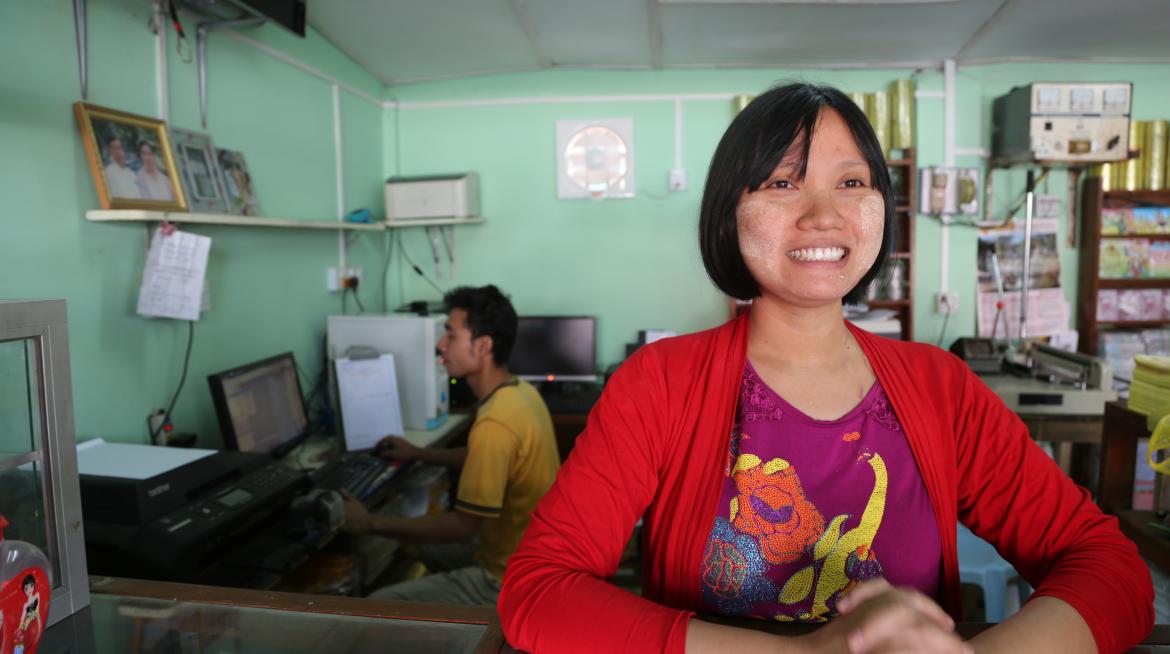
Myanmar shows great potential for further economic development, but factors hindering progress include poor infrastructure, poor energy distribution and the lack of skilled workers.
Lack of skills causes both unemployment and underemployment – the International Organisation for Migration (IOM) estimates that up to 10% of Myanmar’s workers migrate internationally, but most of them are low-skilled, making money in low-paid jobs, and sending back low-level remittances to their home villages.
The Livelihoods and Food Security Fund’s updated strategy promotes ‘stepping out’ and diversification of income. By creating possibilities for farming and landless families to become skilled and be more productive away from smallholder farming, they can choose to ‘step out’ of farming. Some may step into jobs supporting agricultural services, others may migrate to cities to find better paid work.
Opportunity to step out can take the form of vocational training. In Kayin State, LIFT is funding partner Adventist Development and Relief Agency’s (ADRA) upgrade of Technical Vocational Education and Training (TVET) facilities in the capital Hpa-An.
Government-supported TVET is not new to Myanmar - there have been training initiatives here since the 1960’s - but the training is disparate and managed across no less than 18 ministries. Furthermore, TVET in Myanmar has not had strong links with industry and the quality of the older programmes was not trusted.
The first thing ADRA did was an Opportunity and Needs study. What they found was that, after 60 years of conflict in Kayin State, young people were coming to the capital looking for opportunity instead of heading for the border. Support was given to upgrade the TVET facilities at Hpa-An Technical College, and staff were sent to Thailand for training within its TVET system. Then three courses were piloted, providing hands-on training in agricultural machinery and motorbike repair, computer operation and tailoring. Using lessons from the pilot courses, the programme was then repeated.
The three-month courses are followed by a compulsory two-week internship with a relevant business. For the duration, students receive a living costs stipend, which is given to them in bulk on completion of the course and gaining the qualification. Some have used this to help them set up their own businesses. Others have found employment.
“Before this, I lived in my home village helping my mother,” says 22 year old Maung Ki La. “There wasn't much work for me there, nor anyone else for that matter. We lived off the money sent every month by a relative who works in Bangkok as a cleaner.”
Maung Ki La is a high school graduate and had the basic education required to join the TVET computer studies course. Her internship took her to Daw Po Po’s printing shop on Hpa An, where she was subsequently offered a job.
“It’s a win-win situation,” says Po Po, the owner of one of the 30 or so printing shops in Hpa An. “I get trained staff, and they get sound employment”.
In this and other training projects, LIFT contributes towards developing the human resources that will sustain Myanmar’s economic growth.
Please also watch this video on LIFT's YouTube channel, showing the change in fortune for a graduate of the pilot sewing course:


